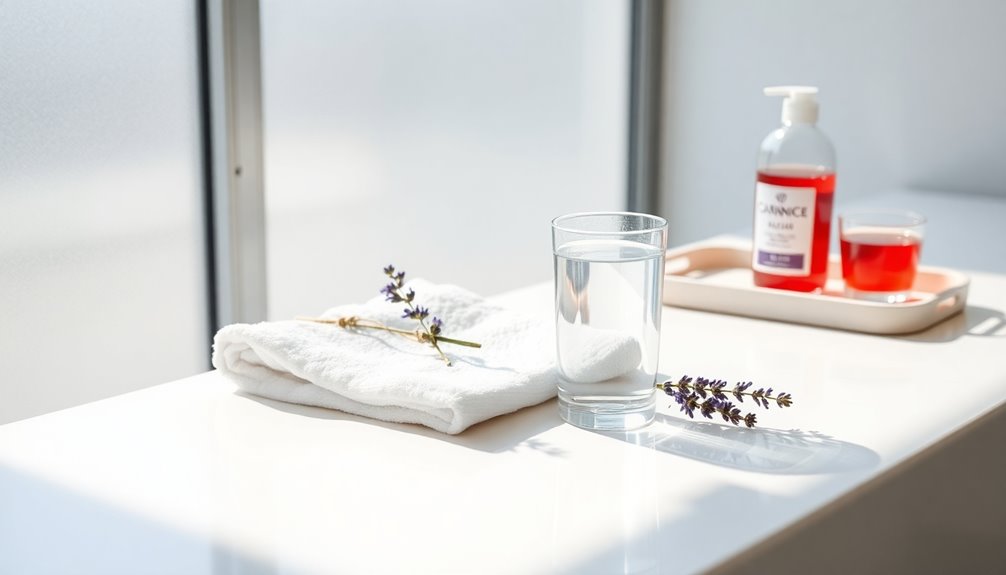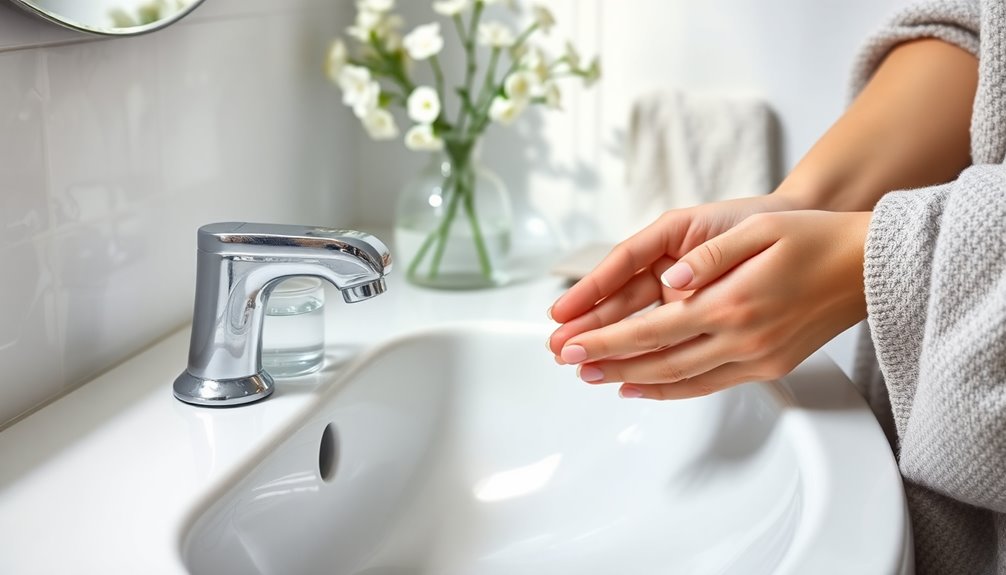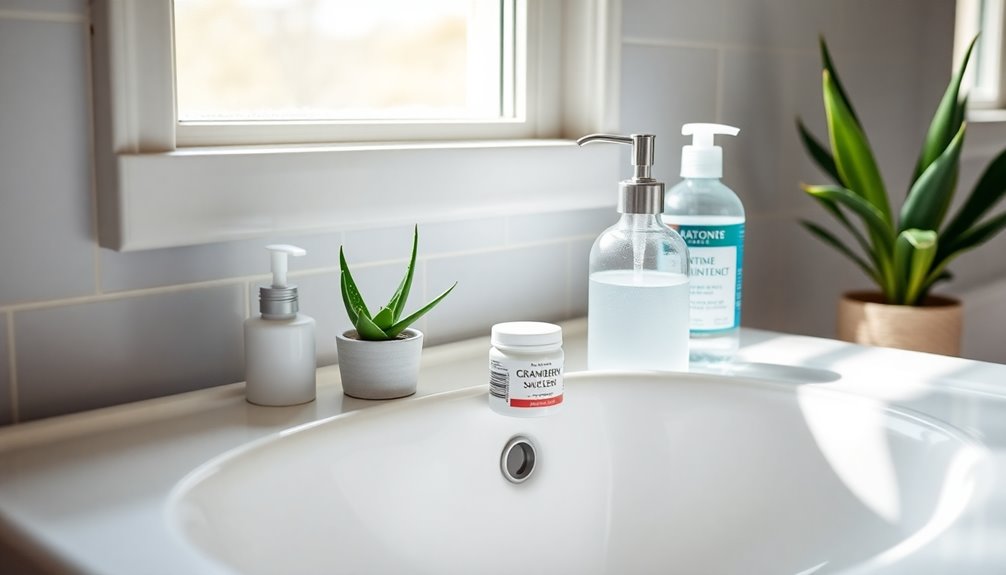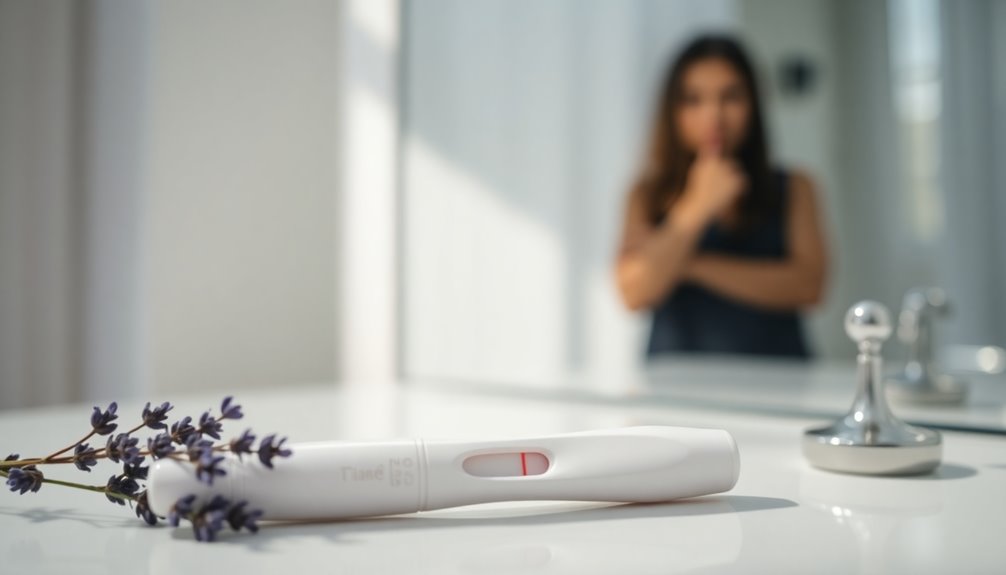To prevent UTIs from sex, start by practicing good hygiene. Wash your genital area before and after intercourse, and always urinate right after to flush out any bacteria. It's a good idea to urinate before sex too. Choose breathable cotton underwear and avoid tight clothes that trap moisture. Staying well-hydrated helps, so aim for at least eight glasses of water daily. Limiting new sexual partners can also reduce your risk. If you're curious about additional strategies and lifestyle changes to keep your urinary health in check, you'll find plenty of helpful tips ahead.
Key Takeaways
- Maintain good hygiene by washing the genital area with mild soap before and after sexual activity to reduce bacteria introduction.
- Urinate immediately after intercourse to help flush out any bacteria that may have entered the urethra.
- Wipe from front to back after using the restroom to prevent bacteria transfer from the anal area to the urethra.
- Stay well-hydrated by drinking at least 8 glasses of water daily to dilute urine and promote regular urination.
- Wear breathable cotton underwear and avoid tight-fitting clothing to reduce moisture retention and irritation in the genital area.
Understanding UTIs and Their Causes

When you engage in sexual activity, it's important to understand how it can increase your risk of developing a urinary tract infection (UTI).
Sexual activity can introduce bacteria from the genital area or anus into the urethra, often leading to a bladder infection. Women are particularly susceptible due to their shorter urethra.
Factors like new sexual partners and certain contraceptives can further heighten this risk.
To prevent UTIs, maintaining good hygiene before and after sex is essential. Urinating after intercourse helps flush out any introduced bacteria, reducing the chance of recurrent UTIs.
Common Symptoms of UTIs

Urinary tract infections (UTIs) can manifest through several uncomfortable symptoms that prompt attention. You might experience a burning sensation during urination, along with frequent urges to urinate, often producing little output.
Cloudy urine or changes in odor can also signal a UTI. Many individuals report pelvic pain or pressure that accompanies the urgency to urinate.
In severe cases, systemic symptoms like fever, chills, nausea, and vomiting can indicate a possible kidney infection. Women may additionally notice abdominal discomfort, which can further signal a bladder infection.
Recognizing these symptoms of a UTI early is essential, as approximately 60% of women will experience at least one UTI in their lifetime, highlighting the need for prompt treatment.
Importance of Hygiene Practices

Good hygiene practices are essential in preventing urinary tract infections (UTIs), especially during and after sexual activity.
You should wash your genital area with mild soap and water before and after intercourse to minimize bacteria introduction. After sex, urinating immediately can help flush out any bacteria that may have been pushed toward your urethra.
Remember to wipe from front to back after using the restroom; this simple action prevents bacteria from the anal area from reaching the urethra. Additionally, avoid using scented products in the genital area, as they can irritate and disrupt your natural flora.
Ensuring that both you and your partner maintain good hygiene is vital for reducing the risk of UTIs.
Hydration and Fluid Intake

Maintaining proper hygiene is just one part of the equation in preventing UTIs; hydration plays a significant role as well. Drinking at least 8 glasses of water daily helps dilute urine and promotes regular urination, flushing out bacteria from your urinary tract after sexual activity. Staying well-hydrated supports bladder health, making it less susceptible to infections.
Here's a quick reference on hydration and its benefits:
| Benefit | Description |
|---|---|
| Dilutes Urine | Helps flush out bacteria |
| Promotes Urination | Encourages regular urination |
| Supports Bladder Health | Maintains healthy bladder tissue |
| Reduces UTI Risk | Lowers bacteria concentration in urine |
| Cranberry Juice | May help prevent UTIs without added sugars |
Sexual Practices to Consider

When it comes to preventing UTIs during sexual activity, adopting certain practices can make a significant difference.
First, urinate before and immediately after sexual intercourse to flush out bacteria that might enter the urethra.
Using water-based lubricants can help reduce friction and irritation, lowering your risk of infection.
Avoid douching, as it disrupts the natural vaginal flora, creating an environment where bacteria thrive.
Engaging in monogamous relationships and limiting your number of sexual partners also decreases exposure to new bacteria.
Additionally, choose sexual positions that minimize pressure on the bladder to further reduce the likelihood of pushing bacteria into your urinary tract.
Implementing these practices can effectively help prevent urinary tract infections.
Clothing Choices and Comfort

When it comes to preventing UTIs, your clothing choices play a key role.
Opting for breathable fabrics like cotton and moisture-wicking materials during workouts can keep the genital area dry and comfortable.
Breathable Fabrics Importance
Choosing breathable fabrics for your clothing can profoundly impact your comfort and overall health, especially when it comes to preventing UTIs.
Opt for cotton underwear, as it promotes airflow and reduces moisture buildup that can lead to bacterial growth in the genital area. Avoid tight-fitting clothing, which traps heat and moisture, creating an ideal environment for bacteria to thrive.
Instead, wear loose-fitting pants to encourage airflow, helping maintain a healthy balance of bacteria and reducing UTI susceptibility.
Additionally, make it a habit to change out of wet clothing promptly, whether from swimming or exercising, to minimize prolonged moisture exposure.
Moisture-Wicking Choices
Opting for moisture-wicking fabrics can make a significant difference in your comfort and health, especially during physical activities. These materials help keep your genital area dry, effectively reducing the risk of bacterial growth that can lead to UTIs.
Choose breathable cotton underwear to enhance air circulation and minimize moisture retention compared to synthetic options. Avoid tight-fitting clothing, as it traps moisture and creates a warm environment conducive to bacteria.
After swimming or exercising, promptly change out of wet clothes to prevent prolonged moisture exposure that can irritate the urethra.
Finally, consider wearing loose-fitting pants during physical activity to promote airflow and reduce friction, further decreasing the likelihood of UTI development.
Medical Advice and Treatment Options

Seeking medical advice is essential for anyone dealing with recurrent urinary tract infections (UTIs). Consulting a healthcare provider can lead to effective treatment options, such as prophylactic antibiotics or a post-coital antibiotic regimen, which reduces the risk for a UTI after sex. If you're postmenopausal, discussing estrogen therapy may help alleviate symptoms and enhance protective bacteria in the bladder. Regular check-ups can also monitor your urinary health and identify underlying issues.
| Treatment Option | Purpose |
|---|---|
| Prophylactic Antibiotics | Prevent future UTIs |
| Post-Coital Antibiotic Regimen | Reduce infection risk after sex |
| Estrogen Therapy | Address vaginal atrophy and UTI risk |
Prompt medical attention is vital if UTI symptoms worsen.
Lifestyle Changes for Prevention

To effectively prevent UTIs, you should prioritize hydration and hygiene.
Drinking plenty of water and maintaining cleanliness before and after sex can make a big difference.
Adopting these lifestyle changes helps keep your urinary tract healthy and less prone to infection.
Hydration and Fluid Intake
Staying well-hydrated plays an essential role in preventing urinary tract infections (UTIs), especially after sex. Aim to drink at least 6 to 8 glasses of water daily to flush out bacteria from your urinary tract.
Adequate hydration helps dilute urine, lowering the concentration of bacteria and making infections less likely to develop. Increasing your fluid intake also promotes regular urination, which is vital for eliminating any bacteria that may have entered during sexual activity.
Consider adding cranberry juice or supplements to your routine for additional benefits, though concentrated supplements are preferred over sugary juices.
Maintaining proper hydration supports your overall urinary health, ensuring your bladder and urinary system function effectively to prevent UTIs.
Hygiene Practices and Techniques
Maintaining proper hygiene practices is essential for reducing the risk of urinary tract infections (UTIs) related to sexual activity.
Here are some key techniques to follow:
- Urinate before and after sex to flush out bacteria.
- Wash your genital area with mild soap and water for ideal genital hygiene.
- Always wipe from front to back after using the restroom to minimize bacteria spread.
- Wear breathable cotton underwear and avoid tight-fitting clothing to reduce moisture.
Frequently Asked Questions
How Can I Prevent Getting a UTI From Sex?
To prevent getting a UTI, you should urinate before and after sexual activity to flush out any bacteria.
Maintain proper genital hygiene by cleaning thoroughly with mild soap and water. Staying well-hydrated helps dilute your urine, reducing bacterial growth.
Consider using water-based lubricants to minimize friction and irritation.
Finally, avoid spermicide-containing contraceptives, as they can disrupt your natural vaginal flora and increase the risk of infections.
Why Does My Bf Keep Giving Me UTIS?
It feels like your boyfriend's turned into a UTI factory, doesn't it? If you're constantly battling infections, it could be due to a few factors.
His hygiene might be lacking, or maybe he's introducing bacteria from new sexual practices. Even certain contraceptives can mess with your body's balance.
Pay attention to these details, and don't hesitate to communicate your concerns. Your health should always come first in any relationship!
Is Peeing After Sex Enough to Prevent UTI?
Peeing after sex isn't enough on its own to prevent UTIs. While it helps flush out bacteria, combining this practice with good hygiene and staying hydrated is key.
You should aim to urinate within 15-30 minutes post-intercourse for maximum effectiveness.
Don't forget to maintain overall genital hygiene, and if you have recurrent UTIs, consult a healthcare provider for personalized advice.
Taking these steps together offers better protection against infections.
Can I Prevent a UTI if I Feel It Coming?
When you feel a UTI creeping in, it's like an unwelcome guest knocking at your door.
To keep it from settling in, drink plenty of water to flush out bacteria. Urinate frequently, especially if you sense discomfort, and consider a heating pad for relief.
Good hygiene is essential, so remember to wipe front to back.
You might also try cranberry juice or supplements, as they could help keep those pesky bacteria at bay.
Conclusion
By taking proactive steps, you can considerably reduce your risk of UTIs after sex. Isn't it worth a little extra effort for comfort and health? Prioritize hygiene, stay hydrated, and be mindful of your sexual practices and clothing choices. Remember, your body deserves the best care possible. If you encounter persistent issues, don't hesitate to consult a healthcare professional. Protecting your well-being is always in style!










